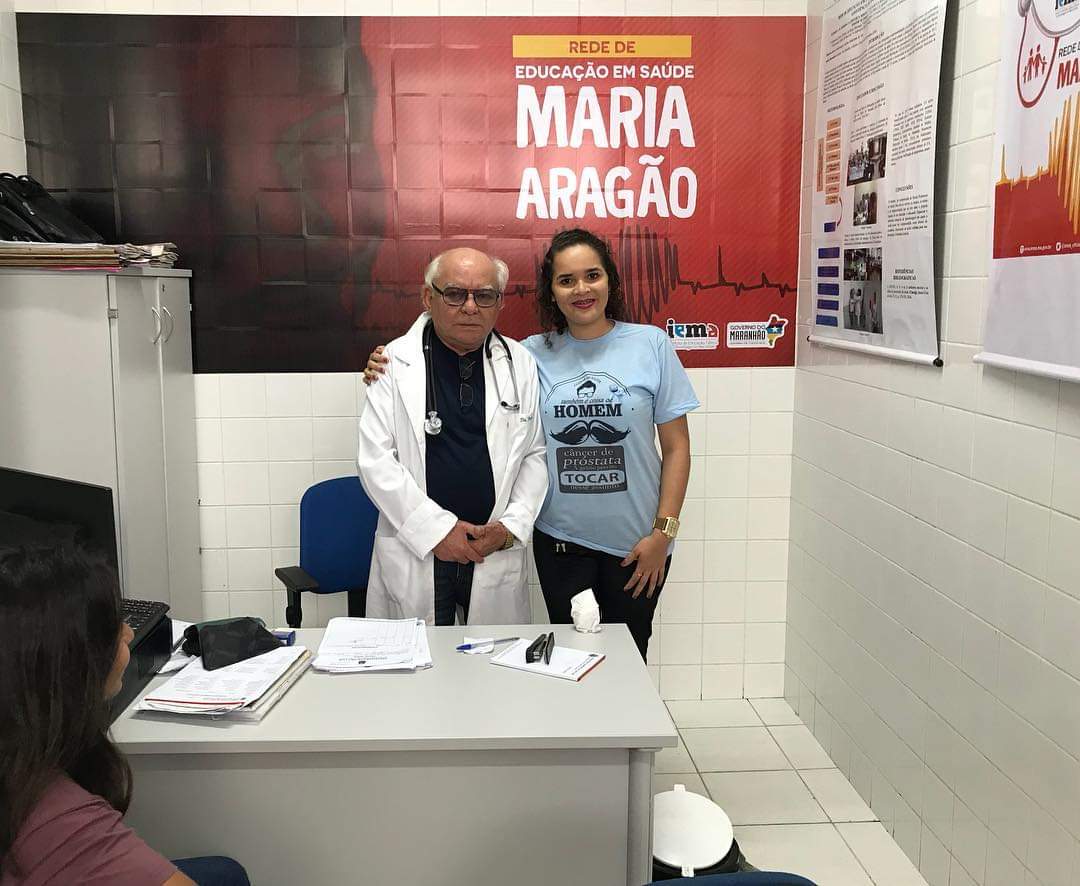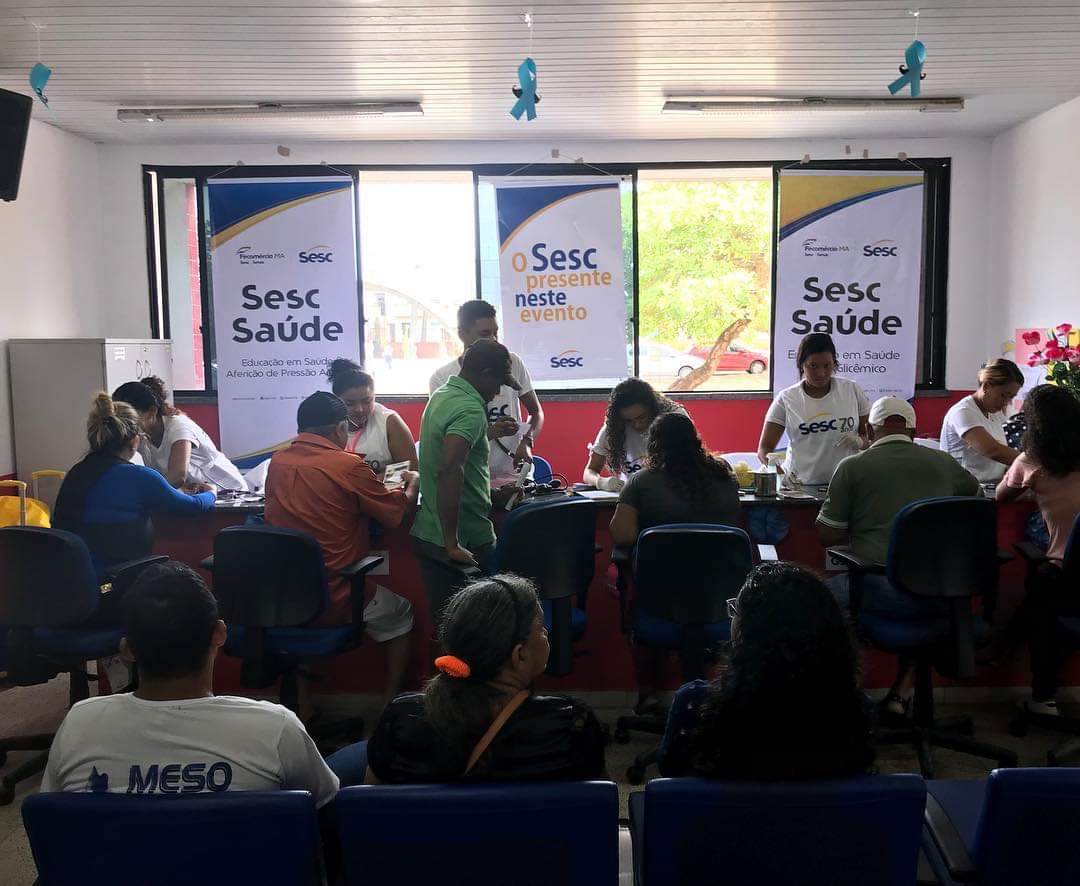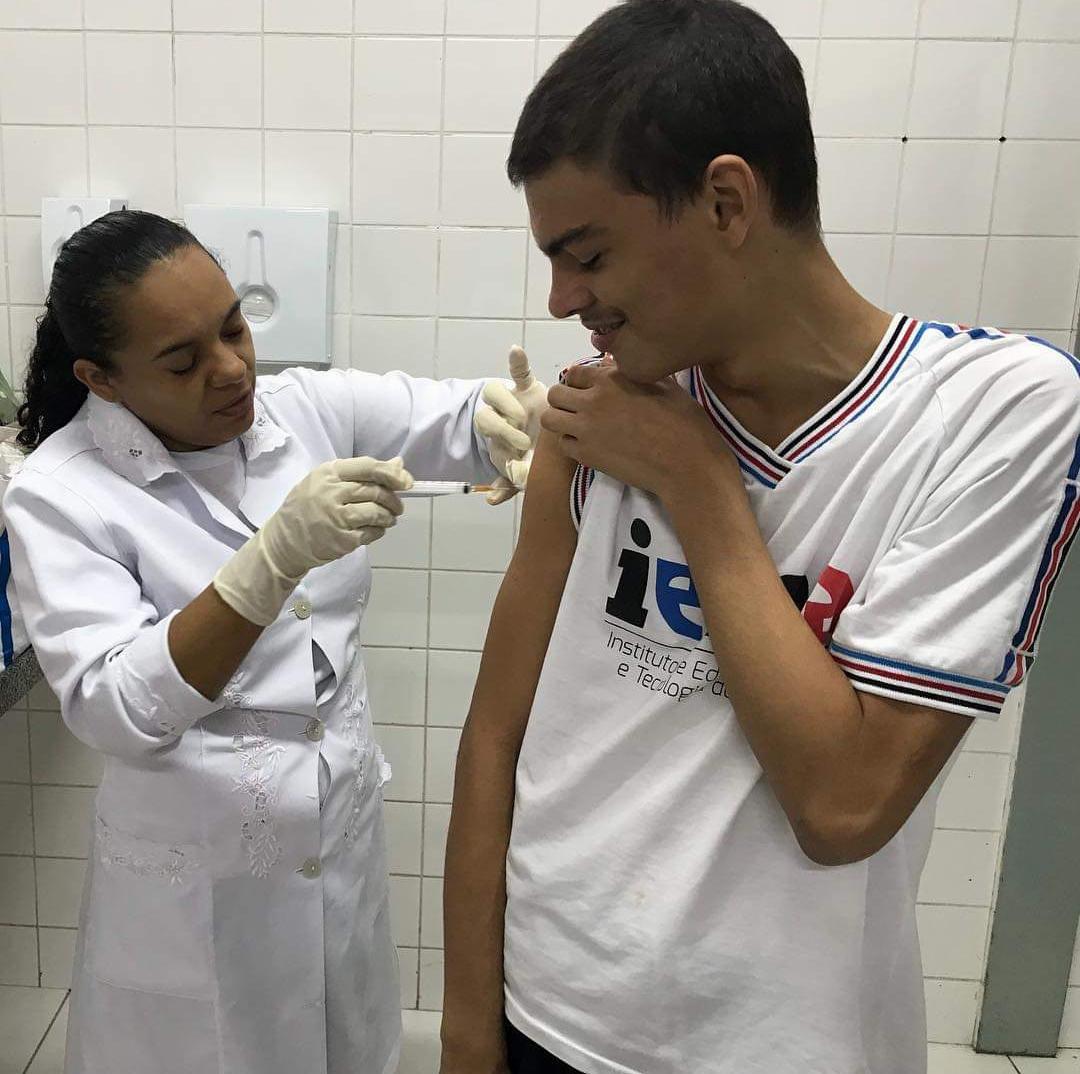THE MARIA ARAGÃO HEALTH NETWORK IS A SUSTAINABLE DEVELOPMENT OBJECTIVE (ODS) TO ENSURE A HEALTHY LIFE AND PROMOTE WELL-BEING IN THE SCHOOL ENVIRONMENT OF STUDENTS OF THE STATE OF MARANHÃO
Description
Maranhão, located in the Northeast of Brazil, carries the stigma of being the state with the highest concentration of income and social inequality of the Federation. According to the Index of Gini (IBGE, 2018), which indicates the concentration of income in a given location, in Maranhão, this value is 56.38%. In this context, The Maria Aragão Health Network emerges as a strategy in achieving the goal of sustainable development in ensuring a healthy life and promoting well-being in the school environment of an integrated, full-time high school; the State Institute of Education, Science and Technology of Maranhão (IEMA).
To insert the nursing professional for the promotion of health in the school, expanding the opportunities to develop educational practices, considering the specificity of each adolescent. In addition, reaffirming the rights of citizens, priming for citizenship of health care. <br />
To encourage the relevance of the role of nurses as educators in health, relying on the support of teachers and management, thus reinforcing the beneficial actions of the interdisciplinarity in schools.<br />
To offer nursing professionals the opportunity to perform training/updating of the professionals of the Network in courses offered by the State Secretary of Health (SES) for improvement of the service and partnerships for the realization of the educational work.<br />
To accompany Iema students in order to allow these adolescents an environment in which they can develop emotionally and intellectually, strengthening their interpersonal relationships and the healthy construction of sexuality, therefore considered an important phase of the life cycle.<br />
To accompany the approximately 22.43% Iema students who present morbidities and raise awareness about the treatments and care for a normal and healthy life.<br />
Address related issues related to the adolescence phase such as unprotected sex, inadequate nutrition, sedentarism, the use of licit and/or illicit drugs, including alcohol and tobacco consumption. These factors predispose the emergence of sexually transmitted infections, unwanted pregnancies, accidents and violence, as well as vulnerability to chronic non-transmissible diseases such as obesity and dyslipidemias.<br />
To reinforce the construction of social relations among the young protagonists, in the face of an environment characterized by diversity while unveiling and healing concerns about health, sexuality, growth, development and other conflicts inherent to adolescents.<br />
Encourage the creation of an environment conducive to discussions of issues related to preventive health, as well as to give students a co-responsibility for their health care.<br />
Encourage the participation of parents, relatives, instructors, managers and health team of the institution to establish moments of dialogue, counseling, and health education activities that enable the construction of critical consciousness regarding the importance of building healthy habits.<br />
To corroborate collective practices and activities in Network, contributing to the training and retention of trained health personnel in the municipalities and communities where IEMA is present and which have great socioeconomic vulnerability.
The State Institute of Education, Science and Technology of Maranhão-IEMA is a teaching institution whose purpose is to offer vocational, technological and scientific education of the middle level in the state of Maranhão and aims to broaden the offer of education Medium-level technical professional in the state. IEMA should promote the integration and verticalization of basic education to vocational education and higher education, with an emphasis on socioeconomic development, regional potentialities, preservation of the environment, transparency and democratic management. IEMA is organized in the Plenas units, vocational units and Science Education Center. While Plenas units offer to teenagers of 12 Municipalities in maranhenses secondary education integrated to technical and full-time education. The Maria Aragão Network in Health started in the year 2017 as an integral part of the IEMA pedagogical political project and in the context of fostering the integration and permanent articulation of education and health in the school environment, providing improvement in the quality of life of students and servants, with interventions based on educational practices, in order to broaden the knowledge of students to promote health and self-care
Although nursing professionals, following a common schedule, have existed in the units since the beginning of IEMA in 2016. It was only in 2017, however, that these professionals became part of a network. This change has meant greater homogenization and traceability of their actions.
Prior to the implementation of the Maria Aragão Health Network, the IEMA nurses should apply a health questionnaire to all the students in order to know the morbidities and the physiological state of the students, with a network implementation process, all nurses also passed to feed forms online, the computerized tool (IBUTUMY) that allows archiving and monitoring of IMC data and generates automatic graphics. In addition, the practice of supervised work and the fulfillment of a calendar of actions in the school also became part of the work in the Network Maria Aragão in Health.
The monitoring of the coordination of the Network has also become crucial for the work in the IEMA Full Units to be effective, not counting on the regular meetings and the promotion of the training and continuous training for professionals.
The schedule and programming include, in addition to routine nursing appointments, referrals to specialists, clarification about treatment and conducts, and also thematic talks and discussion.
It is important to highlight that all the actions and activities of the Network are aligned with the IEMA pedagogical model, so there is constant dialogue between teachers and local management to insert a "health calendar" next to the institution's academic calendar, with activities promoting the IEMA. which are in accordance with the national calendar. Activities may occur in isolation or in addition to other activities.
In the process of research on the impacts and results of the Maria Aragão Network in the IEMA Full Units, semi-structured questionnaires were applied to all 13 professionals of the Maria Aragão Health Network and to the students from each Plena Unit attended. The following results were obtained: Health professionals, since the creation of the IEMA, in 2016, 14,830 routine visits to IEMA's Full Units. On average, 27.5 calls are made weekly. It was found that about 22.43% of IEMA students present with morbidities and that the main morbidities found among these adolescents are: allergies, gastrointestinal problems, spinal diseases, gynecological problems (endometriosis and PCOS), mental disorders, epilepsy, diabetes and hypertension.
The majority of medical referrals are to psychiatrists, psychologists, gynecologists, dentists and cardiologists. In the responses given by the nursing professionals of the Maria Aragão Network in Health, regarding the follow-up of adolescents with chronic diseases, all said that follow-up was important because it brought greater awareness and behavioral change in students with diabetes or morbid obesity, for example.
Another important result of the Maria Aragão Network is the assiduous participation of students in the so-called "Conversation Wheels", which are moments in which health professionals talk with students about a certain topic. At that moment, these students have their questions answered and can share their acquired knowledge on some subject. The topics covered in the Wheels of Conversations are: Sexuality in Adolescence; Teenage pregnancy; Sexually Transmitted Infections (STIs); Drug Use and Alcohol Abuse; Diseases and Mental Disorders.
Another impact to be shared concerns the importance of working health in the school in the format of the Network, that is, so that nurses and technicians work together cohesively, respecting a schedule of specific actions. All the professionals said "yes", that networking is like the Maria Aragão Health Network is important, especially in the school environment. In one of the reports, nurse Samara Letícia Pereira stated: "Networking, in the context of education, in health is very important. The processes of articulation, planning and systematization together strengthen the services, actions, activities and attendance, guaranteeing closer relations and broadening the range of actions."
Nursing professionals expressed satisfaction in working in a network as well. Most professionals interviewed already have extensive professional experience, but they said that "Education for health, prevention and health promotion, taking into account that school and health are closely related and the educational institution can and should become a place for health promotion."
Commitment and involvement of nurses and nursing technicians;
The physical structure of the units allows the development of pedagogical educational activities in health and care;
Material and primary health supplies available at the unit;
Application of the student's health questionnaire allows access to information about the health-disease process of the relevant students that can interfere in the school performance as well as allow better monitoring of the student's health;
The implementation of the computerized tool (IBUTUMY) allows archiving and monitoring of IMC data and generates automatic graphics;
Team of teachers, interpreters and managers who collaborate with the activities developed;
Strengthening the confrontation of vulnerabilities in the field of health that could jeopardize the full development of the school;
Reduction of students' absences due to health reasons.
Regarding factors that challenge and restrict the performance of the nursing professionals of the Maria Aragão Network in Health, we can mention:
Adequacy of the work of the Network to the school hours;
Shortage of time due to limitation of time due to disciplines;
Unavailability of transportation to partner logistics to go to school;
Some lack of material in the ward for care and procedures;
Omission of parents or guardians in the health monitoring of students;
Difficulty in carrying out partnerships that assist voluntary activities.
Networking allows knowledge sharing among nursing professionals, semiannual meetings, activity planning, the annual Work Plan tool; the commitment of the nursing team in the execution of the proposed activities;
The sense of protagonism engendered by the IEMA pedagogical model in boys and girls that makes them want to take ownership of all valid knowledge in the area of Health;
The institution's data collection instrument (IBUTUMY), where it is possible to make a decision in order to improve professional practice;
Assistance of the team of teachers and school managers in the activities developed.
Adolescence is a period full of questions that enable emotional and intellectual growth, strengthening of interpersonal relationships, and the construction of the experience of affectivity and sexuality, and is therefore considered an important phase of the life cycle. However, in this period of change, there is the development of autonomy and a sense of independence in relation to the family, as well as the experimentation of new behaviors and experiences that can lead to health risk factors, such as unprotected sex, inappropriate diet, sedentary lifestyle, the use of licit and / or illicit drugs, including alcohol and tobacco. These factors predispose the emergence of sexually transmitted infections, unwanted pregnancies, accidents, and violence, as well as vulnerability to chronic noncommunicable diseases such as obesity and dyslipidemias.<br />
The initiative of a Health Network within the school context is precisely to give these adolescents, who are in the majority, in a situation of socioeconomic vulnerability, the opportunity to fully develop, as advocated by the vision of student protagonism.<br />
We conclude that the main success factor of the Maria Aragão Network in Health is to educate for health, prevention, and health promotion, taking into consideration that school and health are closely related and that an educational institution should and can transform into a place of promotion of health.
Another valid piece of information is in terms of the extension of activities to the community around the Full Units. Some actions like World Health Day, October Pink, Blue November, Family Day at School, Children's Day. In addition, the Maria Aragão Network advocates and encourages the establishment of partnerships with other health professionals and institutions.
On the results measured from the interviews with the students. ALL were unanimous in reporting that "yes" that they considered the work of the nursing professionals of the Network Maria Aragão in the IEMA important. 100% of the students interviewed said yes that they can understand the themes in the Wheels of Conversations and when asked about the topics that most aroused interest the three themes that appeared the most were: October Pink, Blue November, teenage sexuality, IST's.
On the impact and importance of the Maria Aragão Network and the presence of a nursing professional in school, we have obtained some reports.
"For the important need of technical and theoretical nursing knowledge that guides and helps students in their school and personal life".
(student A.K.S)
"It's important because in addition to knowing a lot of things related to health, we have talks and talks. We have an excellent nurse who is here to help us in every way. "
(student A. K. M.R. F)
"In the first analysis, health in any field is something that must be prioritized. Secondly, the professionals who work in the Full Units, besides contributing to harmony in the school environment, guarantee safety and tranquility to the students and teachers of the IEMA ".
(student A. B. S.A)
Finally, of the 13 nurses interviewed, 7 told us that they have developed research and scientific work based on the data found in the IEMA. This is also one of the great merits of Networking, the incentive to research and extension, and the socialization of results.
Deliverables & Timeline
Resources mobilized
Partnership Progress
| Name | Description |
|---|
Feedback
Action Network


Timeline
Entity
SDGs
Region
- Latin America and the Caribbean
Geographical coverage
Photos



Website/More information
Countries

Contact Information
ANNA PAULA PEREIRA, MASTER
